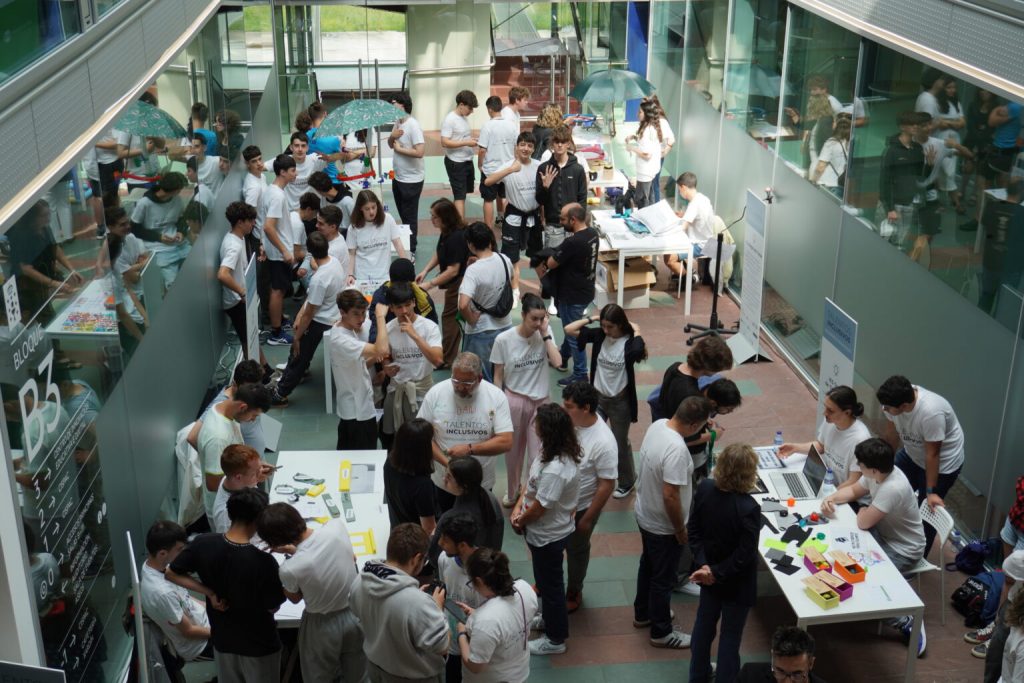
Educational institutions can now apply to the VI edition of the Talentos Inclusivos program by CITIC at UDC
- The program aims to boost creativity, technological thinking, and collaboration among Secondary, Baccalaureate, and Vocational Training students, promoting innovative solutions for diversity support.
- The application is open until October 7.
A Coruña, September 25, 2025.- Schools across Galicia can now submit their applications to participate in the upcoming edition of CITIC’s Talentos Inclusivos program — an initiative connecting young people with technology challenges proposed by individuals with cerebral palsy and fostering STEM vocations.
The Regional Ministry of Education, Science, Universities, and Vocational Training, through the General Directorate of Educational Organization and Innovation, has officially launched the 6th edition of Talentos Inclusivos for the 2025–2026 academic year.
This initiative combines technological innovation and diversity inclusion, encouraging creativity, technological skills, and teamwork. Students, teachers, CITIC researchers, and social organizations will co-create real technological solutions to improve the quality of life for people with disabilities.
Proposals may cover areas such as augmentative communication, rehabilitation robotics, accessible home automation, 3D-printed assistive products, or inclusive gaming.
Participation and School Commitments
Each challenge will involve up to 10 students, while each school may participate in multiple projects (up to 40 students total). Selection will be based on criteria such as previous experience, availability of technological resources and facilities, and participation in similar educational programs.
Applications must be submitted via email to asesoria.igualdade@edu.xunta.gal by October 7, the final deadline.
Participating teachers will receive an official certification of 20 hours of continuing education in educational innovation, recognizing their role in implementing and coordinating the program.
This edition is expected to further highlight disability as a field of innovation, while students gain technical skills, collaborative attitudes, and social awareness. Developed solutions may be implemented in schools, partner organizations, or through CITIC, promoting an inclusive and technologically advanced educational model.
About Talentos Inclusivos
Talentos Inclusivos is a project developed by CITIC (UDC) and ASPACE Coruña, with support from the Spanish Foundation for Science and Technology (FECYT) under the Ministry of Science, Innovation, and Universities; the Social Council of UDC; the City Council of A Coruña; and the Regional Government of Galicia through the Departments of Education, Science, Universities and Vocational Training, and Social Policy and Equality.
Its goal is to inspire STEM vocations among students and raise awareness about disability through collaborative teams tackling technological challenges proposed by individuals with cerebral palsy.
Secondary and Baccalaureate students from various Galician schools will work on solutions to challenges presented by users of ASPACE Coruña, Amanecer-ASPACE, APAMP (Association of Families of People with Cerebral Palsy), and the Cruz Roja A Coruña Vocational Training Center.
More information: https://talentosinclusivos.citic.udc.es/
About CITIC
CITIC is a research center advancing excellence in ICT R&D+i, founded in 2008 by the University of A Coruña. Its scientific activity is structured around four main research areas: Artificial Intelligence, Data Science and Engineering, High-Performance Computing and Intelligent Services and Networks, with a cross-cutting area,Cybersecurity.
CITIC is accredited as a Center of Excellence and a member of the CIGUS Network for 2024–2027, validating the quality and impact of its research. Its structure and enhancement are co-funded by the Regional Government of Galicia and 60% by the European Union under the Galicia ERDF Operational Program 2021–2027, within the thematic objective of promoting “a smarter Europe: innovative and intelligent economic transformation” (ED431G 2023/01).





